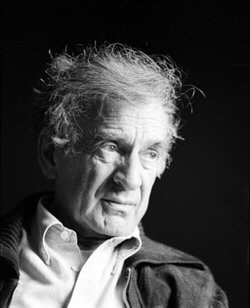I’ll be honest – I didn’t immediately realize that January 29 was Holocaust Remembrance Day. And yet, as I looked for my next inspiration during this past week, my eye was drawn to a slim volume on my bookshelf. It had been years since I first read “Night,” by Elie Wiesel, and at a time when the world seems to be in a huge upheaval, it seemed like a good place to turn to for thoughts about the human condition.
Born in 1928 in Transylvania, Wiesel was just 16 when his family of 5 was taken from their home, along with their village of faithful Jews. Separated quickly from his mother and sisters, he and his father became part of the horror that was Auschwitz-Birkenau.
His descriptions of the camp – from the crusts of bread to the torture of beatings – are at once journalistic and surreal in their brutality, as they reveal the extent of man’s evil. I would not attempt to describe them with any but his own words:
“Never shall I forget that night, the first night in camp, that turned my life into one long night seven times sealed.
Never shall I forget that smoke.
Never shall I forget the small faces of the children whose bodies I saw transformed into smoke under a silent sky.
Never shall I forget those flames that consumed my faith forever.
Never shall I forget the nocturnal silence that deprived me for all of eternity of the desire to live.
Never shall I forget those moments that murdered my God and my soul and turned my dreams to ashes.
Never shall I forget those things, even were I condemned to live as long as God Himself.
Never.”
– from Night, by Elie Wiesel
So what, exactly, is my inspiration from Wiesel? Survival? I was certainly struck by the ability of these prisoners to adjust to the horrors of their new existence. But many of them did not survive, and as Wiesel himself suggests, much of that was pure luck. When in 1944 his foot was injured and became swelled, it could have been the end for him – but he recovered. He made it through “selections,” he was able to do enough right things to avoid death, while others, including his mother, little sister, and ultimately his father, did not.So while his story astounds me with the recognition of just how much the human body and spirit can endure, it is something else that drew me to Elie Wiesel.
His determination to tell the story.
Since the time we learned to communicate, humans have relied on gifted writers and archivists to record what has happened. To relay the ugly truths that, along with triumphs, have marked our days on this planet. We look to these historians to tell us about how slavery became an entrenched labor system; how people who thought differently became persecuted; how, in a land right in our midst, men and women were forced to dig their own graves before being shot into them, as part of a Final Solution. We depend on them to provide the gruesome, firsthand details so that we cannot pretend it was all just a tale.
Not all who experience horror can talk about it, let alone use it to fuel a life focused on teaching new generations and speaking out for those who were forever silenced. People like Elie Wiesel, combining their will to survive with a gift for language, deliver a service whose value is immeasurable and survives far beyond their time on earth. They inspire us to speak out, to tell what happened, rather than assume the worst cannot, will not, happen again.
I end this week with a question: How will we bring our own stories into the world? We may not all be bestselling writers, but each of us has a gift to share, a way to communicate the lessons we’ve learned. Are we bringing our wisdom to each encounter? Teaching from our tragedies, as well as from our victories? Lighting the way for others? If so, we might truly say that we are making the most of our time here – as Elie Wiesel did his.


